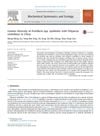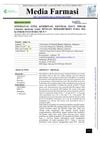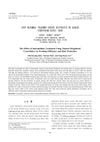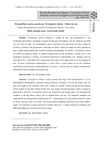 10 citations,
May 2019 in “BMC Complementary and Alternative Medicine”
10 citations,
May 2019 in “BMC Complementary and Alternative Medicine” The extract from Bacillus/Trapa japonica fruit helps increase hair growth and could be a potential treatment for hair loss.
 10 citations,
August 2014 in “Skin research and technology”
10 citations,
August 2014 in “Skin research and technology” Sleep, testosterone levels, and a specific enzyme activity affect skin oil production in women.
 9 citations,
November 2019 in “Scientific reports”
9 citations,
November 2019 in “Scientific reports” The AC 2 peptide from Trapa japonica fruit helps protect hair cells and may treat hair loss.
 9 citations,
February 2005 in “Plastic and Reconstructive Surgery”
9 citations,
February 2005 in “Plastic and Reconstructive Surgery” Improved technique for facial surgery hides scars and maintains hairline.
 3 citations,
January 2005 in “Media Asia”
3 citations,
January 2005 in “Media Asia” Advertising in China shifted towards entertainment, favored local brands, and played a significant role in the country's move to a consumer economy.
 2 citations,
July 2015 in “Biochemical Systematics and Ecology”
2 citations,
July 2015 in “Biochemical Systematics and Ecology” Different types of Armillaria fungus have a high genetic variety when partnering with Polyporus umbellatus mushrooms in China.
 1 citations,
January 2024 in “Theranostics”
1 citations,
January 2024 in “Theranostics” Exosomes show promise for future tissue regeneration.
 1 citations,
June 2023 in “Ethnobotany research and applications”
1 citations,
June 2023 in “Ethnobotany research and applications” The review concludes that the Ziziphus species, especially jujube, may promote hair growth and have various health benefits, warranting more research.
 October 2024 in “Media Farmasi”
October 2024 in “Media Farmasi” Combining soursop leaf extract with doxorubicin may improve breast cancer treatment and reduce side effects.
 April 2024 in “Journal of pharmacy & pharmacognosy research”
April 2024 in “Journal of pharmacy & pharmacognosy research” A compound from Calophyllum inophyllum L. leaf may help treat non-small cell lung cancer.
 February 2024 in “Buletin Veteriner Udayana”
February 2024 in “Buletin Veteriner Udayana” Using sulfur soap helped improve skin problems in a dog with demodecosis.
 January 2024 in “Scientific reports”
January 2024 in “Scientific reports” Egyptian Mint effectively kills mosquito larvae and inhibits certain bacteria.
 January 2024 in “Seven Editora eBooks”
January 2024 in “Seven Editora eBooks” Different techniques measure hair properties to ensure cosmetic products work.
 January 2024 in “Jurnal Ilmu Kesehatan Hewan”
January 2024 in “Jurnal Ilmu Kesehatan Hewan” Oreo the dog got better from skin and worm infections after treatment and cleaner living conditions.
 January 2024 in “International journal of pharmaceutical sciences review and research”
January 2024 in “International journal of pharmaceutical sciences review and research” Indian jujube has many medicinal properties and can help treat ailments like diabetes, inflammation, and cancer.
 November 2023 in “Frontiers in pharmacology”
November 2023 in “Frontiers in pharmacology” Drug repositioning offers hope for new, affordable treatments for a genetic skin disorder called ARCI.
 August 2021 in “Han'gug miyong haghoeji/Journal of the Korean society of cosmetology”
August 2021 in “Han'gug miyong haghoeji/Journal of the Korean society of cosmetology” Using natural polyphenol cross-linkers like tannic acid and green tea extract in perm treatments improves curling and protects hair.
 January 2021 in “Revista brasileira de higiene e sanidade animal”
January 2021 in “Revista brasileira de higiene e sanidade animal” A dog with skin lesions was successfully treated for a human-type fungal infection.

Two nutritional supplements improved hair growth and reduced hair loss in women with hair loss conditions.
20 citations,
October 1995 in “PubMed”  7 citations,
December 2022 in “Plants”
7 citations,
December 2022 in “Plants” Guava leaf extract may help treat hair loss and protect cells by blocking certain genes and fighting damaging molecules.
7 citations,
December 2021 in “Pharmaceutics” The nanoemulsion with garlic oil, apple cider vinegar, and minoxidil could effectively treat alopecia areata.
64 citations,
October 1998 in “Acta dermato-venereologica” Grape seed proanthocyanidins can promote hair growth.
60 citations,
July 2014 in “Autophagy” The protein FLCN is involved in cellular cleanup and is regulated by ULK1.
32 citations,
July 2017 in “Oncotarget” Alternating treatment with two drugs could help cells in a rapid aging disease.
 20 citations,
June 2022 in “Molecules”
20 citations,
June 2022 in “Molecules” Thiazole, a sulfur and nitrogen chemical, is useful in creating potential drugs for conditions like seizures, cancer, bacterial infections, tuberculosis, inflammation, malaria, viruses, Alzheimer's, diabetes, and A1-receptor issues.
17 citations,
March 1992 in “PubMed” 9 citations,
June 2022 in “Plants” Shallot extract may help with hair growth and treating hair loss.
5 citations,
January 1994 in “PubMed”  1 citations,
August 2023 in “Andrology”
1 citations,
August 2023 in “Andrology” Finasteride changes hormone levels and certain proteins in rats, but these effects can be reversed after stopping the drug.





















